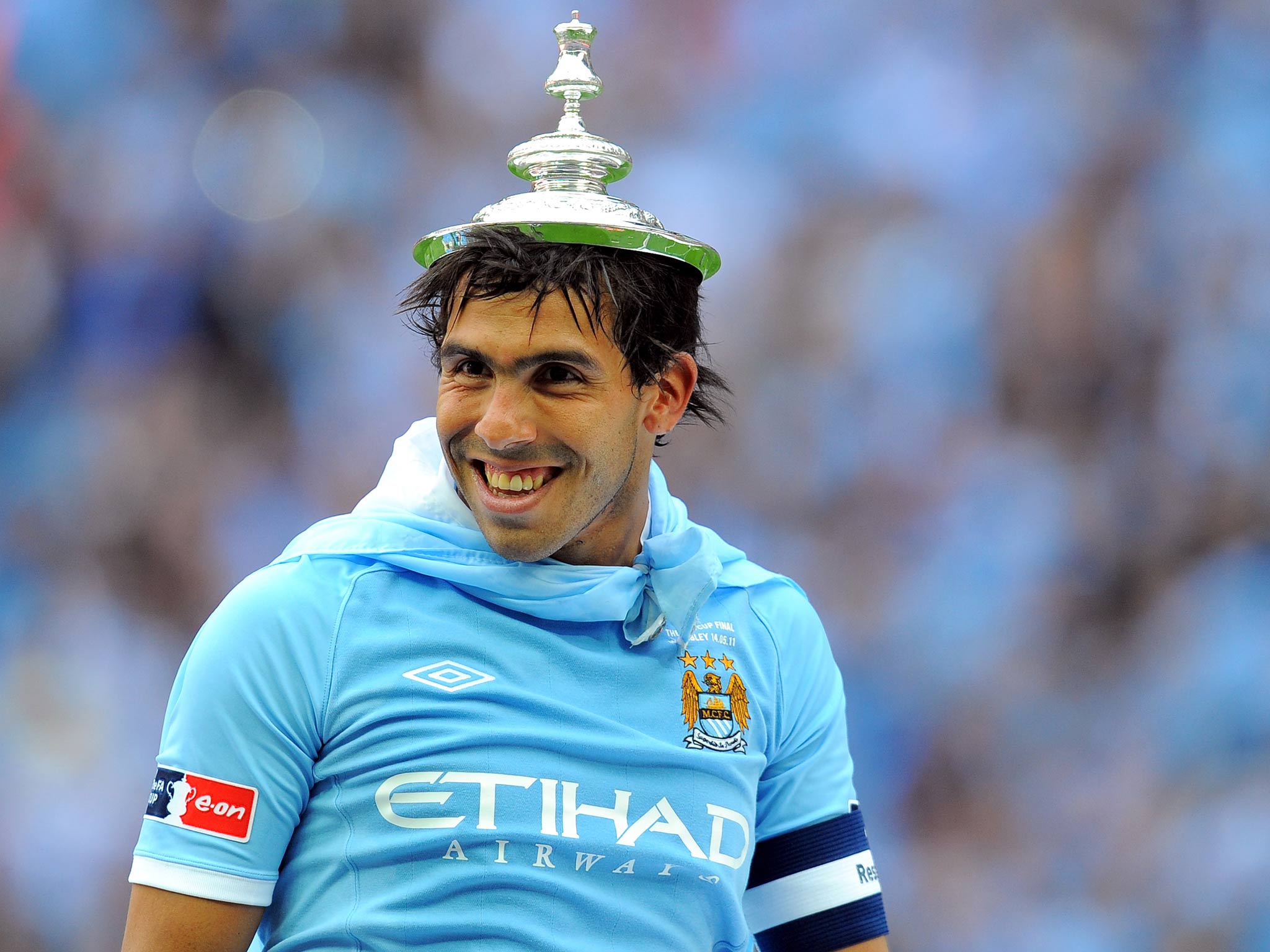The FA Cup: The most accident-prone trophy in football
The oldest piece of silverware in football has been on quite a ride

Many people dream of lifting the FA Cup, and, it seems, quite a few of those who do so end up dropping it, too. The result is that the famous piece of silverware is not only football’s most venerated trophy, but it is its most accident-prone as well. And so, before every showpiece final, it is called in for repairs, as well as buffing and polishing.
For the past 17 years, that task has fallen to Kevin Williams, master silversmith at Thomas Lyte silver, and his team. They are now at work on the past year’s knocks and scuffs ahead of Saturday’s final between Manchester City, going for their second win in three years, against Wigan Athletic, aiming for their first major trophy.
The Cup has returned to the workshop with a variety of ailments ranging from “seriously bad dents” to the famous removable lid (pictured above as headwear for Manchester City striker Carlos Tevez back in 2011) having broken in two.
“The base it sits on doesn’t sustain much damage but the foot is always bent over and, no matter who wins the Cup, the worst damage is to the lid. Someone once dropped it, bent it and it has come apart in their hands when they’ve tried to straighten it,” said Kevin.
He refuses to name the team responsible but admits, with a grin, that it happened “in recent years”. “Their face must have been a picture when that happened. Fortunately we put it right.”
Restoration work is the trickiest part of his job, he says. “When you’re given something as precious as the FA Cup, which the nation treasures, or a personal item that a family treasures, you take the responsibility seriously. The last thing you want is to turn a flame on something and it melts to a blob.”
Dating back to 1871, the FA Cup is the world’s oldest domestic cup competition. The current trophy is the fourth version and dates from 1992, when it replaced a 1910 model that became too fragile. FA Cup (Mark IV) has weathered tough times. It fell from a plinth after Portsmouth won it in 2009, while the Chelsea team dropped it from their bus after winning the previous year.
After Portsmouth’s decision to take the Cup on a 60-school tour, Kevin’s colleague Tony Cimmering let slip to a local newspaper that it came back “the worst it has been”.
Despite jubilant footballers on Final Day throwing the trophy to each other and using it as a giant champagne flute – “not corrosive to silver, so that’s all right” – most damage is done during the year on its travels: the Football Association allows the winners to keep the original for functions and fund-raising events until just a few weeks before the next final, when Kevin gets his hands back on it.
Speaking to The IoS from Thomas Lyte’s Burlington Arcade shop in London, Kevin looks every inch the high-powered executive, well-groomed and wandering around Piccadilly in his blue pin-stripe suit with, appropriately, silver hair.
Yet it is back in his Essex workshop dressed in his “proper” outfit where he feels most at home. “My hands give away my real work,” he says. “You get a lot of cuts and scratches and get used to picking up things that are very hot so lose some sensitivity. Warm things to me feel burning to someone else.”
Kevin attended a “reasonably artistic” secondary modern school in London and was inspired by his metalwork teacher, an ex-silversmith, who recognised his flair. Having started out in the 1970s as a 16-year-old apprentice, he set up his own business 20 years later. Just over five years ago his business was acquired by a company that became Thomas Lyte. “It’s a modern-day success,” says Kevin, 58, who has seen a decline in the silver trade over the past four decades. “We’re one of the few workshops increasing in size and taking on more trainees and apprentices, which is great.”
Kevin and his team have developed a global reputation for their work.
The Sultan of Oman asked last year for a series of jewel-encrusted pieces of work to be made for his royal palace, based on a variety of horse poses. “We’ve even done a commission of 300 gold-plated tissue boxes for hotels in Oman. It’s a great export to have.”
Subscribe to Independent Premium to bookmark this article
Want to bookmark your favourite articles and stories to read or reference later? Start your Independent Premium subscription today.

Join our commenting forum
Join thought-provoking conversations, follow other Independent readers and see their replies